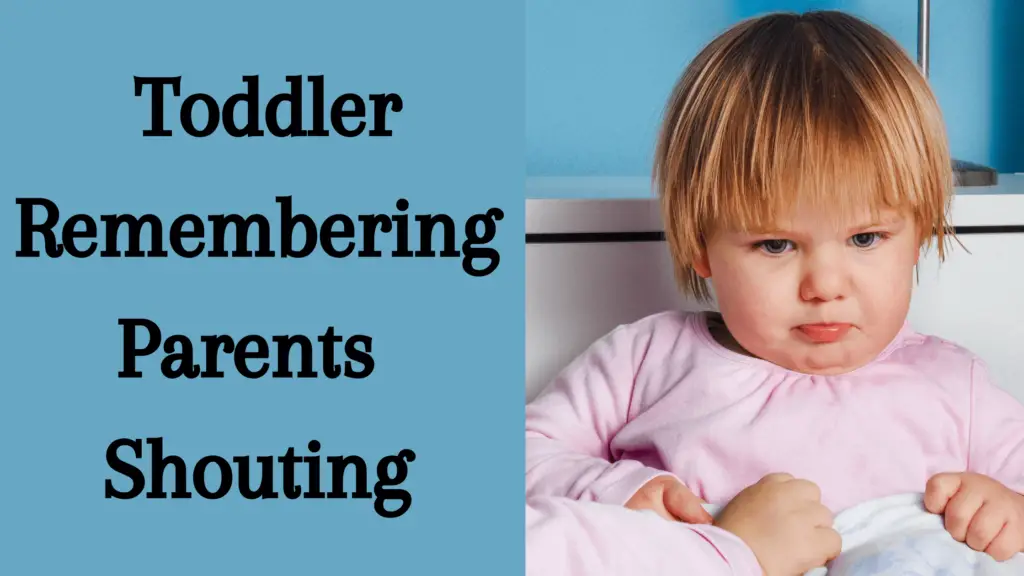As parents, we’ve all been there – those moments of frustration when our patience wears thin, and we find ourselves raising our voices. Mostly in an attempt to manage our toddler’s challenging behavior. But in the midst of those heated moments, a common worry tends to creep in: will my toddler remember me shouting? Will my outbursts leave a lasting mark on their memory? These concerns are valid, and it’s essential to have a compassionate and informed perspective.
The Developing Memory of Toddlers
To get the correct answer to the question “will my toddler remember me shouting?” it is important to understand how toddler memory works. Toddlers are in the process of building their memory foundation, which operates differently from that of adults. Their memory can be categorized into sensory memory, short-term memory, and long-term memory.
Sensory Memory
Toddlers’ sensory memory is exceptionally active. They absorb sights, sounds, and sensations like sponges, but these memories are fleeting and don’t typically last long. Think of sensory memory as a brief snapshot of a moment – the feel of a soft teddy bear, the scent of baking cookies, or the sound of rain tapping on the window.
Short-Term Memory
Short-term memory is a bit more complex. Toddlers can retain information for a short period – think of it like a mental sticky note. This is why they can remember instructions you give them shortly after you say them. For instance, if you tell your toddler to put away their toys, they might do so, at least in part, because the memory of your request is still fresh in their minds.
Long-Term Memory
Long-term memory is the most intriguing. While toddlers might not recall specific instances from their earlier years, research suggests that they can remember emotionally significant events. These memories might not be accessible in adulthood, but they can shape a child’s emotional responses and overall development. These emotional imprints can be powerful, impacting how children perceive the world around them and how they react to various situations.
Will My Toddler Remember Me Shouting
The answer to the worry: will my toddler remember me shouting? is that although toddlers might not remember specific instances of you shouting, they can remember the emotions associated with those moments. The emotional responsiveness of toddlers is significantly heightened, making them keenly attuned to emotional cues, shifts in tone of voice, and even nonverbal signals conveyed through body language. Consequently, the emotional resonance of these experiences can carve a lasting mark on their memory and contribute significantly to their emotional growth. While precise recollections of individual events may diminish with time, the emotional resonance tied to your interactions will persist and play a substantial role in shaping their broader perception and emotional welfare.
Toddlers possess relatively short attention spans, so isolated incidents of yelling might not make a lasting impression. Yet, if yelling becomes a frequent occurrence or if its intensity is heightened, your toddler is more inclined to retain these memories. Due to their developmental stage, toddlers struggle to grasp the context surrounding yelling. The reasons behind your raised voice might elude them, and they might interpret it as an indication of danger or anger. This interpretation can evoke fear and uncertainty, potentially leading to feelings of anxiety or insecurity.

If your toddler’s response to your yelling is characterized by tears, fear, or withdrawal, they are more likely to form enduring memories of these instances. This is because they are associating the act of yelling with the negative emotions it elicits.
Emotional Impact of Shouting
Toddlers might not remember the specifics of your raised voice during a particular incident, but they do have a remarkable ability to remember emotions. Young children are remarkably perceptive when it comes to reading emotional cues, tone of voice, and body language. When you raise your voice in anger, frustration, or even desperation, your child picks up on these emotions, which can leave a lasting impact.
Emotional memories, even from a young age, can have a profound influence on a child’s emotional development. Think about it: when you’re feeling overwhelmed or upset, do you recall specific words or moments, or do you remember the feelings associated with those times? It’s often the latter. Similarly, your toddler might not remember the exact words you said during a heated moment, but they can remember how those words made them feel. The emotional charge attached to those memories can linger and affect their emotional responses in the future.
Parent-Child Bond and Trust
The parent-child bond is a delicate yet incredibly powerful force in a child’s life. Trust and security are at the core of this bond, and they play a significant role in a child’s emotional well-being. Frequent yelling can erode this foundation, impacting the trust your toddler has in you.
Research indicates that a consistent pattern of shouting can have detrimental effects on parent-child trust. When your child repeatedly hears your raised voice, they might start to associate you with stress and anxiety. This can lead to a breakdown in the secure attachment that is vital for healthy emotional development. The trust your toddler places in you is a cornerstone for their sense of safety and emotional stability. When this trust is compromised, it can affect their self-esteem, confidence, and ability to form healthy relationships later in life.
Read About: Psychological Effects of Yelling at a Child
Strategies for Effective Discipline
It’s understandable that parenting can be overwhelming, and there will be moments when you feel like your patience is running thin. However, there are alternative strategies for disciplining your toddler that can foster a positive environment without resorting to shouting. These are:
Positive Reinforcement
Positive reinforcement involves acknowledging and rewarding your child’s positive behaviors. When they exhibit good behavior, praise them or offer a small reward. This approach helps them associate good behavior with positive outcomes. For instance, if your toddler picks up their toys without being asked, you can say, “Great job cleaning up your toys! You’re such a helpful big kid.”
Time-Outs
Time-outs offer both you and your toddler a valuable opportunity to regain composure in moments of tension. Ensure that the duration of the time-out is concise and take the time to clarify the reason behind it. This clarification aids your child in comprehending the link between their behavior and the ensuing consequence. Within the context of a time-out, your child can engage in introspection regarding their actions and emotions, thereby nurturing their ability to self-regulate. It’s vital to approach time-outs as an educational tool rather than merely a punitive measure, allowing your child to glean insights and learning from the experience.
Redirection
Redirecting your toddler’s attention is a powerful tool. When you sense a tantrum brewing, steer their focus toward a different activity or object. This can help prevent meltdowns and keep the mood light. For instance, if your toddler is upset about not getting a particular snack, you can say, “I know you really wanted that snack, but look at this fun puzzle we can do together!”

Setting Clear Boundaries
Toddlers thrive on routine and structure. Set clear boundaries and communicate them consistently. Knowing what’s expected of them can help reduce frustration and confusion. For example, if it’s time to get ready for bed, you can say, “It’s bedtime now, so we need to brush our teeth, put on our pajamas, and read a story.”
Repairing and Moving Forward
As parents, we’re only human, and there will be times when we lose our temper. The key is to recognize these moments and take steps to repair the damage. Reconnecting with your toddler after a shouting incident is crucial for maintaining a healthy parent-child relationship.
Apologize and Explain
Don’t shy away from apologizing to your toddler. Explain that you were upset and that it’s okay to feel angry sometimes, but shouting is not the best way to handle it. This models emotional intelligence and shows them that it’s okay to make mistakes as long as you learn from them. Apologizing also reinforces the idea that adults can take responsibility for their actions, teaching your child valuable life lessons.
Talk About Emotions
Engage in conversations about emotions with your toddler. Help them identify and express their feelings in a healthy manner. When they see you discussing emotions openly, they’re more likely to do the same. Encourage them to share their thoughts and feelings and listen attentively without judgment. This practice creates a safe space for emotional expression and promotes a deep emotional connection between you and your child.
Quality Time
Spend quality time with your toddler to rebuild your connection. Engage in activities you both enjoy, whether it’s reading, playing, or simply chatting. This helps reinforce the bond of trust and security. Quality time shows your child that you value their presence and enjoy spending moments together. It’s during these shared experiences that your child learns more about themselves and their place in the world, strengthening their emotional development.
Conclusion
In the grand scheme of things, will your toddler remember you shouting? While they might not retain explicit memories of specific instances, the emotions associated with those moments can leave a lasting impression. Young children are perceptive and sensitive, and they absorb the emotional atmosphere around them.
The key takeaway is to foster a nurturing environment where trust, security, and positive emotional experiences prevail. As parents, we’re continually learning and growing alongside our children. By understanding the potential impact of our actions and using alternative discipline strategies, we can ensure that our toddlers thrive emotionally and develop into confident, resilient individuals.







